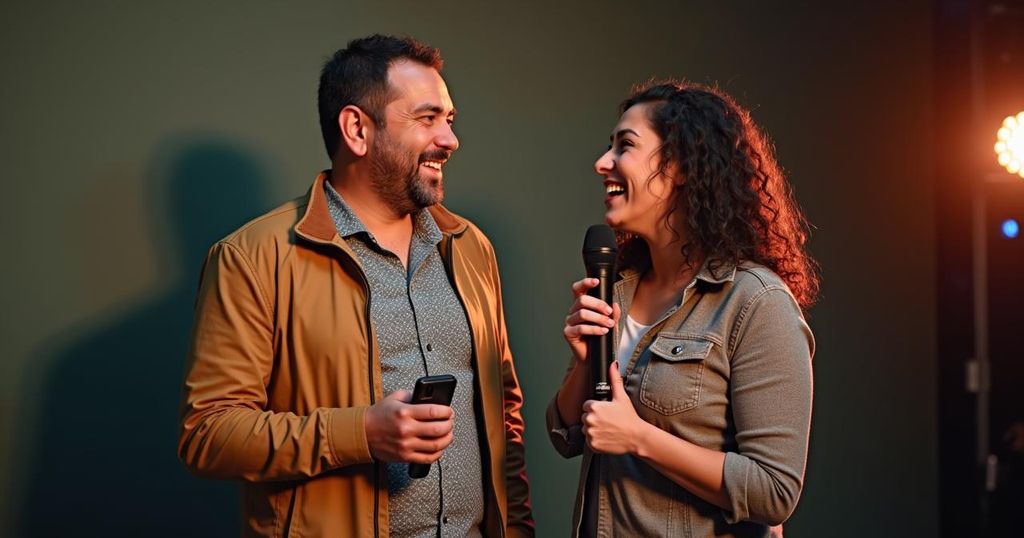The Resilient Laughter of Venezuelan Comedians in Exile
Venezuelan comedians in exile are utilizing humor as a means to express political critique and to forge connections among diaspora communities. This article highlights their experiences, particularly through Estefanía León’s journey and the emergence of the comedy project El Cuartico. As they navigate the realities of life away from Venezuela, these comedians address themes of migration and dictatorship while deftly drawing laughter from the hardships they have endured.
In the face of political oppression and economic turmoil, Venezuelan comedians in exile are finding their voices and leveraging humor as a means of critique and expression. This article recounts the experiences of Estefanía León and her colleagues as they navigate life after fleeing their authoritarian homeland. Estefanía León, a prominent Venezuelan comedian, found herself living in Caracas during the peak of the nation’s economic crisis in 2017, when protests were rampant and food scarcity was widespread. Despite the overwhelming sense of despair, her role as a writer for El Chigüire Bipolar, a political satire site, pushed her to generate comedic content while daily dodging the repercussions of a dictatorship under President Nicolás Maduro. Severely affected by these hardships, León ultimately decided to escape to Mexico City in 2018. Once in Mexico, León and fellow comedians, including George Harris in the U.S. and Víctor Medina in Argentina, began to explore and create content that reflects their experiences as Venezuelan migrants. Their project, El Cuartico, emerged in 2020, initially discussing broader topics but gradually focusing on issues specific to the Venezuelan diaspora, such as immigration and authoritarianism. While comedy serves as their vehicle to reconnect with their identity, it also resonates with audiences across Latin America, as themes like corruption and dictatorship transcend borders. In parallel, other Venezuelan comedians, such as Angelo Colina, are carving out new paths beyond their homeland, often infusing their work with reflections on their current lives in the U.S. In contrast, domestic comedians like Alejandra Otero continue to perform amid political constraints, albeit with careful navigation of sensitive topics. Otero emphasizes the vital role humor plays in challenging the regime, stating, “Humor is obviously something that makes the regime uncomfortable—because humor was born for that, to make people uncomfortable and to criticize.” Ultimately, the plight of Venezuelan comedians symbolizes a larger narrative of resilience. Their ability to find laughter in adversity not only affirms their cultural identity but also serves to challenge authoritarianism and foster connection among Venezuelans, regardless of their geographic location.
Venezuela has been experiencing escalating political and economic crises under Nicolás Maduro’s authoritarian regime, leading to widespread emigration. An estimated eight million Venezuelans have fled their country since 2015, seeking better opportunities abroad. This exodus has significantly impacted the cultural landscape, particularly within the realm of comedy, as many comedians continue their craft outside Venezuela, utilizing humor to address their shared experiences and struggles. The cultural significance of comedians in Venezuela underscores their reputation as societal commentators, providing a unique lens to critique and navigate the hardships imposed by the regime.
The Venezuelan comedy scene has adapted uniquely to the challenges posed by political and economic instability, giving rise to a vibrant community of exiled comedians. Through projects like El Cuartico, these comedians harness the power of humor not only to address the experiences of Venezuelans abroad but also to critique the political landscape of their homeland. Despite varying levels of freedom to express themselves, both exiled and domestic comedians persist in their mission to make audiences laugh, emphasizing humor’s role as a means of resistance and connection in times of crisis.
Original Source: www.nytimes.com




Post Comment